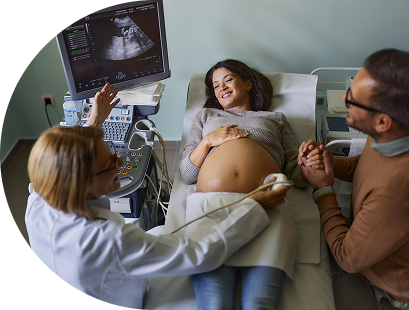

Your prenatal testing journey
Tests and screenings can help you better understand any potential risks to your baby’s health before pregnancy, and help you monitor their development at every stage.
Types of testing
As your baby grows, so can your knowledge about the types of testing available before, during, and right after pregnancy. Here are some common screenings and tests to familiarize yourself with as you navigate your pregnancy.
Prenatal screening
A safe and simple way to screen prenatal DNA and learn about your baby’s risk for certain conditions. Although not a specific diagnosis, screening can help give you peace of mind, or guide your next steps during your pregnancy.
Ultrasound screening
An essential imaging technique used during pregnancy to monitor the development of the fetus. Ultrasounds provide real-time images that help healthcare providers assess fetal growth, detect abnormalities, and determine important details such as gestational age and position.
Diagnostic testing
These tests can sometimes be more invasive, but may be necessary to confirm whether your baby has a certain condition, giving you time to prepare as you plan for what’s ahead.
Newborn screening
A standard screening for your baby after birth. Prenatal screening doesn’t replace newborn screening. Newborn screening helps your baby’s healthcare provider determine whether your child needs additional testing based on the results.
What conditions do these tests typically screen for?
These are a few of the more commonly discussed conditions when it comes to screening and diagnostic testing:
- Down syndrome
- Edwards syndrome
- Patau syndrome
- Cystic fibrosis
- Sickle cell anemia
- Tay-Sachs disease
- Fragile X syndrome
- Neural tube defects
- Spinal muscular atrophy (SMA)
- Hemophilia
1st Trimester


2nd Trimester




3rd Trimester
Postpartum


REFERENCES
- Hogan GJ, et al. Validation of an expanded carrier screen that optimizes sensitivity via full-exon sequencing and panel-wide copy number variant identification. Clin. Chem.2018;64(7):1063-1073. doi:10.1373/clinchem.2018.286823.
- https://sneakpeektest.com/wp-content/uploads/2021/01/Large-scale-follow-up-research-study-SneakPeek-Early-Gender-DNA-Test-99.9-Accurate.pdf
- Welker et al. High-throughput fetal fraction amplification increases analytical performance of noninvasive prenatal screening. Genet Med 23, 443–450 (2021).
- Hancock S, Ben-Shachar R, Adusei C, et al. Clinical experience across the fetal-fraction spectrum of a non-invasive prenatal screening approach with low test-failure rate. Ultrasound Obstet Gynecol. 2020;56(3):422-430. doi:10.1002/uog.21904.
- Hammer C, Pierson S, Acevedo A, Goldberg J, Westover T, Chawla D, Mabey B, Muzzey D, Johansen Taber K. High positive predictive value 22q11.2 microdeletion screening by prenatal cell-free DNA testing that incorporates fetal fraction amplification. Prenat Diagn. Epub 2024. doi: 10.1002/pd.6562
- Newborn Screening Tests. https://www.acog.org/womens-health/faqs/newborn-screening-tests. Accessed May 27, 2025.
- Conditions Screened By State. https://www.babysfirsttest.org/newborn-screening/states. Accessed May 27, 2025.